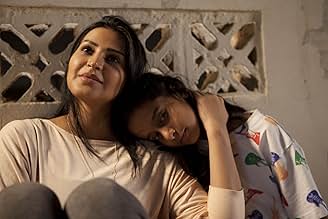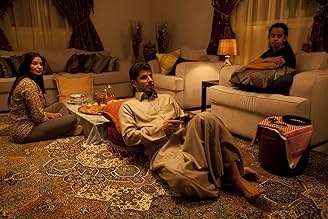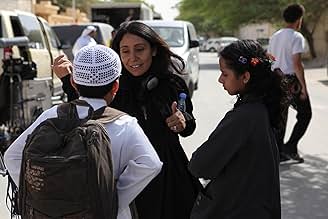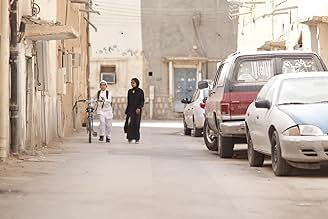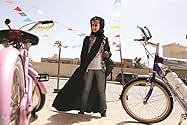VALUTAZIONE IMDb
7,5/10
22.004
LA TUA VALUTAZIONE
Una ragazza saudita intraprendente partecipa alla competizione di recitazione del Corano della sua scuola per raccogliere i soldi rimanenti di cui ha bisogno per comprarsi la bicicletta verd... Leggi tuttoUna ragazza saudita intraprendente partecipa alla competizione di recitazione del Corano della sua scuola per raccogliere i soldi rimanenti di cui ha bisogno per comprarsi la bicicletta verde che ha catturato il suo cuore.Una ragazza saudita intraprendente partecipa alla competizione di recitazione del Corano della sua scuola per raccogliere i soldi rimanenti di cui ha bisogno per comprarsi la bicicletta verde che ha catturato il suo cuore.
- Regia
- Sceneggiatura
- Star
- Nominato ai 1 BAFTA Award
- 22 vittorie e 36 candidature totali
Abdullrahman Al Gohani
- Abdullah
- (as Abdullrahman Algohani)
Sara Al Jaber
- Leila
- (as Sara Aljaber)
Recensioni in evidenza
The director Haifaa Al-Mansour tells the tale of a child called Wadjda whose wish is to have her own bicycle so that she might race against her friend and neighbour Abeer. The only problem is that Wadjda is a girl and girls in Saudi society do not ride bikes, which are considered "boys' toys" ... As we follow Wadjda in her quest to find the money to purchase the bicycle she sees being delivered on the roof of a van, we are introduced to her society and its culture and, in particular, its treatment of girls and women. Al-Mansour's portrayal of her country is shown without heavy judgement, although the bitter sweetness of being female is not concealed.
Filmed on location in Saudi Arabia, a feat in itself in a country that does not have a film industry as films are considered sinful, Wadjda's desire represents the wish for female freedom; her lack of a bicycle is mirrored in the adult women's inability to drive, prohibited for women in Saudi Arabia, and the problems this creates for them. So the child's desire to ride a bike becomes a metaphor for freedom, which is the central theme in the film.
This is a subtle tale full of character, charm and complexities and not at all as one might expect. The young girl who carries the film, Waad Mohammed, is terrific and it is hard to believe that she was not an actress before appearing in this feature.
Does Wadjda achieve her desire and get her bike? Is she able to race it along the dusty roads as free as her friend Abeer and the other boys? Well, you will have to watch the film for the answers and in watching the film will support the director and the nascent film industry emerging from within Saudi Arabia.
Filmed on location in Saudi Arabia, a feat in itself in a country that does not have a film industry as films are considered sinful, Wadjda's desire represents the wish for female freedom; her lack of a bicycle is mirrored in the adult women's inability to drive, prohibited for women in Saudi Arabia, and the problems this creates for them. So the child's desire to ride a bike becomes a metaphor for freedom, which is the central theme in the film.
This is a subtle tale full of character, charm and complexities and not at all as one might expect. The young girl who carries the film, Waad Mohammed, is terrific and it is hard to believe that she was not an actress before appearing in this feature.
Does Wadjda achieve her desire and get her bike? Is she able to race it along the dusty roads as free as her friend Abeer and the other boys? Well, you will have to watch the film for the answers and in watching the film will support the director and the nascent film industry emerging from within Saudi Arabia.
A poignantly triumphant movie, the storyline of "WADJDA" is just as phenomenal as the story of how the film came to be. In short, "WADJDA" represents quite a number of firsts. It's the first feature film shot entirely in Saudi Arabia, a country where cinema is prohibited. Writer and director Haifaa Al Mansour is Saudi Arabia's first female filmmaker. It is also the first submission from Saudi Arabia for the Foreign Language Category for the 2014 Academy Awards.
Set in a country known for its repression of women, the movie follows our title character—a 10-year-old spirited girl—in her journey to buy a new bicycle so she can race her best friend, neighbor and crush Abdullah. Even though Wadjda's mother warns her to stay away from both bikes and boys because of their culture's strict customs, Wadjda is determined to buy her bike with her own hard-earned money, no matter what the consequences. This, in turn, leads to joining a Koran competition at school. If she wins, she will have more than enough to buy a bike and therefore beat the boy next door.
Subtly, the film explores the repercussions from this society in which girls should only be seen, not heard and, in public, only their eyes should be seen, with the rest of their faces covered by black veils. Wadjda tests boundaries in her search for freedom of expression. Although she discovers the contradictions in her world, she's determined to challenge women's traditional roles. The movie covers major topics such as polygamy and child-brides, as well as smaller oppressions such as the restriction of driving and rules of women in the presence of men.
It's mind-blowing to me that a movie about the oppression of women was made in the exact environment it depicts. On DVD, the making-of featurette explores in-depth the struggles and challenges that faced director Haifaa Al Mansour. The line, "respectable girls go inside," is said to Wadjda in the film, and Mansour confronted the same problems. She had to direct her cast out-of-sight using a walkie-talkie to communicate with her cast and a monitor to watch the filming. She could not be seen working with men and often, when religious officials would come to inspect the bustle, production would be halted and moved to another location. It took close to five years to make the movie, but the effort is worth it.
First timer Waad Mohammed is perfect as the fun-loving rebel Wadjda. This film is rated PG and I recommend it for ages 10 to 18. The pace may be slow for kids under ten. This is truly a landmark film that the world needs to watch. I give it five out of five stars. Perhaps the most uplifting message is that although the plot is fiction, the remarkable story behind the movie is not, and that shows that revolution is possible. This film played in theaters last year and will be released on February 11 on DVD/Blu-ray.
Reviewed by KIDS FIRST Film Critic Cassandra H. For more youth reviews go to kidsfirst dot org.
Set in a country known for its repression of women, the movie follows our title character—a 10-year-old spirited girl—in her journey to buy a new bicycle so she can race her best friend, neighbor and crush Abdullah. Even though Wadjda's mother warns her to stay away from both bikes and boys because of their culture's strict customs, Wadjda is determined to buy her bike with her own hard-earned money, no matter what the consequences. This, in turn, leads to joining a Koran competition at school. If she wins, she will have more than enough to buy a bike and therefore beat the boy next door.
Subtly, the film explores the repercussions from this society in which girls should only be seen, not heard and, in public, only their eyes should be seen, with the rest of their faces covered by black veils. Wadjda tests boundaries in her search for freedom of expression. Although she discovers the contradictions in her world, she's determined to challenge women's traditional roles. The movie covers major topics such as polygamy and child-brides, as well as smaller oppressions such as the restriction of driving and rules of women in the presence of men.
It's mind-blowing to me that a movie about the oppression of women was made in the exact environment it depicts. On DVD, the making-of featurette explores in-depth the struggles and challenges that faced director Haifaa Al Mansour. The line, "respectable girls go inside," is said to Wadjda in the film, and Mansour confronted the same problems. She had to direct her cast out-of-sight using a walkie-talkie to communicate with her cast and a monitor to watch the filming. She could not be seen working with men and often, when religious officials would come to inspect the bustle, production would be halted and moved to another location. It took close to five years to make the movie, but the effort is worth it.
First timer Waad Mohammed is perfect as the fun-loving rebel Wadjda. This film is rated PG and I recommend it for ages 10 to 18. The pace may be slow for kids under ten. This is truly a landmark film that the world needs to watch. I give it five out of five stars. Perhaps the most uplifting message is that although the plot is fiction, the remarkable story behind the movie is not, and that shows that revolution is possible. This film played in theaters last year and will be released on February 11 on DVD/Blu-ray.
Reviewed by KIDS FIRST Film Critic Cassandra H. For more youth reviews go to kidsfirst dot org.
One thing that makes this movie stands out is the fact that it is entirely based in Saudi Arabia.
Regardless what one thinks of that country, be that knowledge or just stereotyping, it has a culture that is very different than that of what the western audience is accustomed to.
So he have a heroine who is your typical rebel teenage girl, who has realised that being a woman can be challenging and she therefore must give her fight to survive. The story revolves around an utterly sinful desire this young revolver has: to buy and ride a bicycle. To go about that, she must overcome her mum's objections, the shopkeeper's and pretty much everyone she is acquainted with.
Unprepared to simply accept fate, she is prepared to do whatever it takes to ride that bicycle. Quirky and witty, this is a delight and one should not allow any preconceived notions of Arabic culture to stand in the way of enjoying this pleasurable debut.
Wadjda is a hero in any culture.
Regardless what one thinks of that country, be that knowledge or just stereotyping, it has a culture that is very different than that of what the western audience is accustomed to.
So he have a heroine who is your typical rebel teenage girl, who has realised that being a woman can be challenging and she therefore must give her fight to survive. The story revolves around an utterly sinful desire this young revolver has: to buy and ride a bicycle. To go about that, she must overcome her mum's objections, the shopkeeper's and pretty much everyone she is acquainted with.
Unprepared to simply accept fate, she is prepared to do whatever it takes to ride that bicycle. Quirky and witty, this is a delight and one should not allow any preconceived notions of Arabic culture to stand in the way of enjoying this pleasurable debut.
Wadjda is a hero in any culture.
WADJDA is a straightforward tale of a young girl Wadjda (Waad Mohammed) growing up in a suburb of Riyadh, Saudi Arabia, who wants to buy a bicycle. Unable to find the money to do so, she enters a competition to speak the Koran in public with a substantial cash prize. After considerable time spent studying the text, she wins the competition, but sadly doesn't receive the money. In the end, however, she achieves her dreams - but not in the way she expects. Haifaa Al-Mansour's film is noteworthy for being a woman's film directed by a woman; it shows in careful detail the ways in which women's lives are constructed in Saudi Arabia, as well as showing how influential the Koran is in determining people's behavior. Some viewers might think that the women's lives are unfairly restricted; the film suggests that this is what many women believe is the right thing to do. By doing so, WADJDA shows how different people embraces different concepts of Islam. On the other hand, the film also suggests that individuals - especially children - should have at least some means to express themselves, particularly when they have worked to hard to achieve their aims. To restrict them is also to repress them; and this ultimately leads them to accept subordination as a way of life. WADJDA proves that the opposite should be true; not only for Wadjda herself but also for her mother (Reem Abdullah).
It is quite hard to come to Wadjda with a clear head and I suspect with the awards season coming up, it will be harder to do so in the future, which is why I wanted to watch it now. Part of the reason for this is that the film has had quite a bit of publicity due to its place in history, it being the first film in Saudi Arabia directed by a woman and this made me think that perhaps critics would have been quick to be generous to it. For sure I think this is a factor and the context of it representing (in theory) a country moving towards ever so slightly less hard-line conservatism may also be a factor in awards voting; but my concern was that this mean weaknesses were forgiven and stronger aspects were hyped up. The second thing in my mind was that perhaps Wadja would be very critical of Saudi as it may be seen as "time to settle some scores" and that this would be less a film and more a finger wagging exercise.
The reality is that neither of these are really the case and indeed the main strength of Wadjda is that it is simply a coming-of-age story which is set in Saudi Arabia. This means that the film doesn't push an agenda in a very heavy handed and frequent way, but rather just uses the culture of its setting as part of its story, just like any other such film would do in the context of their country. I liked this a lot because very quickly I was able to settle in and just enjoy the film for its character and story. And it helps that the story is engaging, warm and quite cheering in some ways; Wadjda is a sweet heart to the film and is very well played indeed by Waad Mohammed and she plays very well with her simple goal of just wanting to be herself and not be restricted by others – again a theme that maybe has more significant in her context, but still one common to these types of films. The film plays his out well with other threads and challenges to others around her which resonate with the impact of restrictions but again not in a heavy-handed or really obvious way.
It is a fine line to walk but the film does manage to flag issues for discussion but not to do so in a way that is overly critical or unrealistic even if it is progressive; perhaps to use the right language it is a very subdued and modest criticism and it is never front and centre on the screen. The balance means that it will engage you with the simple structure of its story while also making its points with things shown to inform and characters within the story used to illustrate different aspects of choices to be made – whether it be Wadjda's refusal to be restrained or Ms Hussa's overcompensation for not doing the same herself. It is very well shot and directed – and not "considering the circumstances", but rather it just is. The use of locations is really good, giving the film a strong sense of play and I do hope someday there is a "making of" documentary as I think the daily reality of making this must itself be an interesting story.
Wadjda is a very good film even if I think a lot of the hype and gushing that will come during the awards season is as much about the context as it is about the film itself – although this is not a bad thing by any means. The makers walk a fine line really well – not making direct criticisms so much as telling an engaging and warm story out of which comes the obvious criticisms and discussions which could be had. It does this very well and deserves to be seen as a film as well as a statement.
The reality is that neither of these are really the case and indeed the main strength of Wadjda is that it is simply a coming-of-age story which is set in Saudi Arabia. This means that the film doesn't push an agenda in a very heavy handed and frequent way, but rather just uses the culture of its setting as part of its story, just like any other such film would do in the context of their country. I liked this a lot because very quickly I was able to settle in and just enjoy the film for its character and story. And it helps that the story is engaging, warm and quite cheering in some ways; Wadjda is a sweet heart to the film and is very well played indeed by Waad Mohammed and she plays very well with her simple goal of just wanting to be herself and not be restricted by others – again a theme that maybe has more significant in her context, but still one common to these types of films. The film plays his out well with other threads and challenges to others around her which resonate with the impact of restrictions but again not in a heavy-handed or really obvious way.
It is a fine line to walk but the film does manage to flag issues for discussion but not to do so in a way that is overly critical or unrealistic even if it is progressive; perhaps to use the right language it is a very subdued and modest criticism and it is never front and centre on the screen. The balance means that it will engage you with the simple structure of its story while also making its points with things shown to inform and characters within the story used to illustrate different aspects of choices to be made – whether it be Wadjda's refusal to be restrained or Ms Hussa's overcompensation for not doing the same herself. It is very well shot and directed – and not "considering the circumstances", but rather it just is. The use of locations is really good, giving the film a strong sense of play and I do hope someday there is a "making of" documentary as I think the daily reality of making this must itself be an interesting story.
Wadjda is a very good film even if I think a lot of the hype and gushing that will come during the awards season is as much about the context as it is about the film itself – although this is not a bad thing by any means. The makers walk a fine line really well – not making direct criticisms so much as telling an engaging and warm story out of which comes the obvious criticisms and discussions which could be had. It does this very well and deserves to be seen as a film as well as a statement.
Lo sapevi?
- QuizBecause of restrictions placed on women in Saudi Arabia, director Haifaa Al-Mansour was not allowed to interact with her mostly male crew. She had to direct the street scenes from a nearby van, watching through a monitor and giving instructions via walkie-talkie.
- BlooperWhen Wadjda takes the bread out of the oven, mic equipment is visible on her waist, under her T-shirt.
- ConnessioniFeatured in At the Movies: Venice Film Festival 2012 (2012)
- Colonne sonoreDead Island
© Copyright 2012 and Published by Deep Silver, a division of Koch Media
Gmbh, Gewerbegebiet 1, 6604 Hofen, Austria.
Developed 2011, Techland Sp, z.o.o., Poland,
© Copyright 2012, Chrome Engine, Techland Sp. z.o.o.
I più visti
Accedi per valutare e creare un elenco di titoli salvati per ottenere consigli personalizzati
Dettagli
Botteghino
- Lordo Stati Uniti e Canada
- 1.347.747 USD
- Fine settimana di apertura Stati Uniti e Canada
- 41.253 USD
- 15 set 2013
- Lordo in tutto il mondo
- 6.499.169 USD
- Tempo di esecuzione1 ora 38 minuti
- Colore
- Mix di suoni
- Proporzioni
- 1.85 : 1
Contribuisci a questa pagina
Suggerisci una modifica o aggiungi i contenuti mancanti








